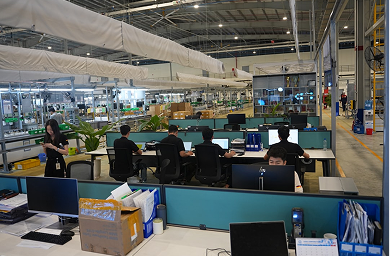The shortage of unskilled labor is becoming an increasingly worrisome issue for FDI companies in Vietnam, especially as the economy gradually recovers and experiences robust growth. From industrial zones in Bac Ninh, Bac Giang, and Hai Phong to the bustling export processing zones of Ho Chi Minh City, the call for “Hiring Unskilled Workers” echoes everywhere but is not receiving an adequate response. So, what is causing this bleak workforce picture, and what solutions can untangle these bottlenecks?
Current State of Unskilled Labor Shortage in FDI Companies
Over the past decade, the electronics and semiconductor industries have become one of Vietnam's main growth drivers, attracting massive investments from FDI companies. Big names like Samsung, Intel, and LG have not only contributed to GDP but also created thousands of manufacturing jobs. However, 2024 has marked a grim reality: the supply of unskilled labor cannot keep up with the explosive market demand.
According to the latest report from the Ministry of Labor, Invalids, and Social Affairs, the electronics and semiconductor industries account for up to 40% of total employment in industrial zones but are facing a severe labor shortage. Statistics show that FDI companies in 2025 are estimated to need an additional 150,000 unskilled workers to meet their production expansion plans, a target currently out of reach.
Reflecting on reality, a big question arises: Why is a country with a young and abundant labor force like Vietnam facing such a severe unskilled labor shortage?
Causes of the Labor Shortage
The reasons behind this shortage go beyond basic issues like compensation or harsh working conditions in industrial zones. Experts suggest that a significant shift is occurring as workers move to other industries, such as services or self-employment. The continuous development of e-commerce platforms and delivery services has also changed employment patterns, making many young workers less interested in assembly line jobs that require high work intensity and offer limited growth opportunities.
Additionally, competition between FDI companies is also part of the problem. A company may strive to improve working conditions and increase wages to attract workers, but this puts other businesses in a position of “competing” to retain their workforce. Meanwhile, GLA HR, a leading provider of human resource solutions, has noted that:"job-seeking trends show a clear shift in geographical preference". Workers from rural provinces are often not enthusiastic about manufacturing jobs in large industrial zones, instead seeking opportunities closer to home or jobs with flexible schedules.
Solutions to the Labor Shortage Dilemma
The bigger question is: What are effective solutions to this issue? To address unskilled workersFDI companies cannot rely on a “patchwork” approach but need to adopt a long-term perspective focused on sustainable development.
- Enhance Job Quality and Benefits: FDI companies should improve not only wages but also the working environment, healthcare benefits, insurance, and career advancement opportunities to retain workers. Creating a safe and healthy workspace is also crucial.
- Collaborate with Human Resource Service Companies like GLA HR: GLA HR has been supporting many FDI businesses in recruiting and training unskilled labor. Using professional HR services optimizes the hiring process, ensuring workforce stability and quality.
- Develop Training and Retraining Programs: Investing in training not only retains employees but also enhances productivity. FDI companies can work with vocational schools to build appropriate skills training programs, enabling workers to operate more effectively in modern production lines.
- Revise Recruitment Strategies: Instead of focusing only on traditional areas, it’s time to expand recruitment to more remote regions where the labor supply is still abundant. Attractive job promotion campaigns can draw attention and attract workers to industrial zones.
Future Prospects and Hopes
Can unskilled workers be resolved in the near future? The answer depends on close cooperation between FDI businesses, human resource providers like GLA HR, and government policies. Only when all parties work toward a sustainable development strategy can Vietnam’s labor market transform robustly, ready to meet the ever-growing needs of FDI companies. This issue is not only a challenge but also an opportunity for businesses to restructure and redefine their workforce future.
Zalo GLA – HR: Việc làm kỹ sư can get HOT JOB opportunities now.



